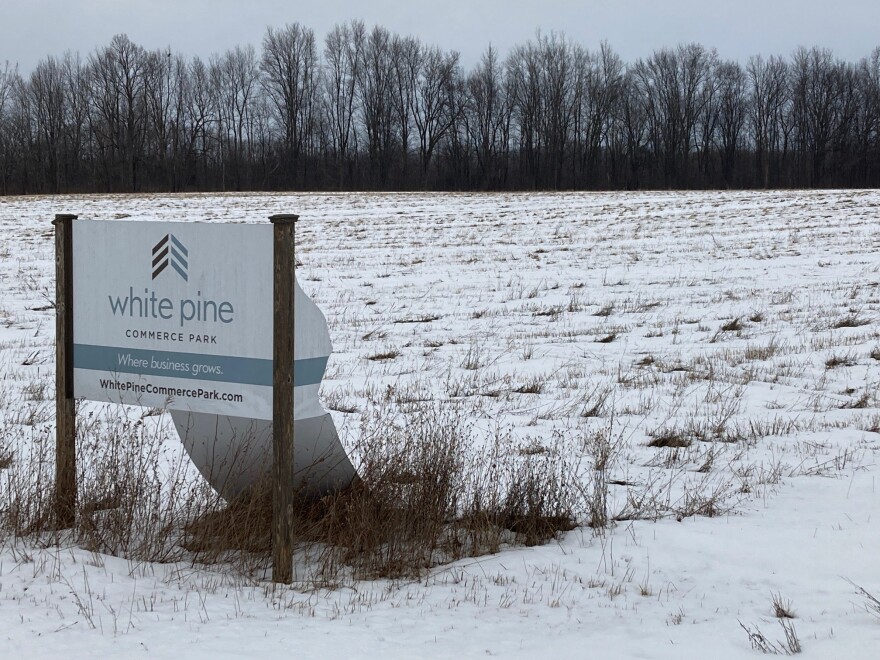Onondaga County is working more aggressively than it has in years to lure potential tenants to the White Pine Commerce Park in Clay.
Town and County governments have been approving water, sewer and utility easements in recent months in hopes of showing that the vacant site is ready for a possible microchip plant or similar facility. In a more controversial move, the county is also trying to acquire or even seize property from long-time homeowners to expand the size of the park.
Onondaga County Executive Ryan McMahon isn't holding back on his optimism for the future of White Pine.
“With the support of Senator Schumer and the potential CHIPS Act, and the unique power, water, and wastewater available at White Pine, we are very much a finalist for a historic investment by the semiconductor industry," McMahon said.

The federal CHIPS Act would allocate $52 billion over five years to support semiconductor research and development, and legacy chip manufacturing. The legislation has the support of both chambers of Congress, but is still months away from reaching President Joe Biden’s desk. Onondaga County hopes to land one of the large chipmakers, which is why it’s making big investments in White Pine.
Back in February, Onondaga County Legislator Julie Abbott acknowledged the skepticism some might have. Lawmakers had just approved an item related to White Pine.
“There is definitely a question out there: 'Why would you bond for $30 million in engineering costs to ready infrastructure for a potential chip plant,'" Abbott said. "We know that we’re competing in a global marketplace, and we need to show these companies that Onondaga County is ready, willing, and committed to providing the infrastructure capacity and we need to be able to, if and when we secure somebody, immediately start with engineering in order to do that.”
In late March, the Town of Clay released temporary easement rights to National Grid to install a gas line to support the White Pine project.
While the infrastructure might be falling into place, the county is still short of the land it wants in order to attract a large chip maker. Jeff Davis spelled it out at an August 24 meeting of the Onondaga County Industrial Development Agency. He’s an attorney representing OCIDA.
"We have about 1,150 acres either in the agency's name or under contract. We have a remaining 100 acres that we do not have," Davis said.
Within the past month, OCIDA paid three homeowners on Burnet Road a combined $1.6 million for property that totals 11.5 acres. More property sales could be in the works. Davis says the agency is ready to deploy other means for those who are not willing to sell their property.
"This resolution would take the step of starting what would be a process, if necessary, to undertake acquisition of lands and easement areas and certain interests by eminent domain," said Davis.
At that same August 24 meeting, board members did vote to allow the agency to use eminent domain.

Britta Serog has lived on Burnet Road since 1963. It runs up the middle of a residential/agricultural zone that the county wants to claim as the rest of white pine.
“The park has been…what they call a park has been vacant since the 1990s," Serog said. "There’s nothing there. There’s a good chance if they took up all this land that it’s just going to stay vacant.”
Many families have grown up together on Burnet Road. Some have roots to the land that go back generations, even as far back as the 1850s. And, they don’t want to leave. Paul Richer is one of them.
“This is not about the money at all," Richer said. "A lot of people think we’re just holding out for more money. We want to change the law…the way it’s being used…abused, I should say. It’s being abused in New York State.”
Chad Reese is the assistant director of activism at the Institute for Justice. They’re prepared to fight any use of eminent domain in court on behalf of residents like Richer and Serog.
“It’s easy to say this type of eminent domain abuse runs rampant in New York State in a way that it does not in almost every other state in the country,” Reese said.
In most states, eminent domain is typically reserved for public uses like the building of a road or highway. Reese said the county has made it clear that it wants to take private property and hand it over for a private economic development project.
“In this case, it’s particularly egregious because it’s a hypothetical property owner or company," said Reese. "The county doesn’t even have any guarantees that something would go here. I think the landowners on Burnet Road and people of Onondaga County should still be upset, and could still be justified in being upset, even if there was a specific company for which land was being seized from homeowners.”
Reese said if homes on Burnet Road can be seized by the government, then any home can. So far, he said there’s no litigation. That would be triggered by a required public hearing if the county were to pursue eminent domain proceedings. Meanwhile, Paul Richer said they’re living in limbo, not wanting to risk spending money on any major home improvements.
“We had plans to do a new garage last year," Richer said."We got the asbestos checked and we were getting ready to have it demolished. All of sudden, all of this started happening. I’m not going to spend money on a garage that I’m not going to use, that they’re just going to tear down.”


